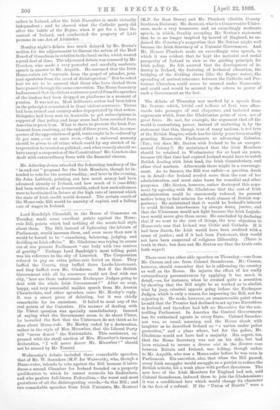Lord Randolph Churchill, in the House of Commons on Tuesday,
made some excellent points against the Home. rule Bill, points which had nothing of the music-hall style about them. The Bill, instead of lightening the labours of Parliament, would increase them, and even more than now it would be forced to be "examining, balancing, judging, and deciding on Irish affairs." Mr. Gladstone was trying to create out of our present Parliament "one body with two centres of gravity." Perhaps Lord Randolph's most telling point was his reference to the city of Limerick. The Corporation refused to pay an extra police-rate levied on them. They baffled the Courts, they baffled three Lords-Lieutenant, and they baffled even Mr. Gladstone. But if the British Government with all its resources could not deal with one city, "how are these unfortunate Exchequer Judges going to deal with the whole Irish Government ? " After an easy, happy, and very successful maiden speech from Mr. Austen Chamberlain, and other speeches, came Mr. Morley's reply. It was a smart piece of debating, but it was chiefly remarkable for its omissions. It failed to meet any of the real pointy of the Unionists. His manner of dealing with the Ulster question was specially unsatisfactory. Instead of saying what the Government mean to do about Ulster, he bewailed the fact that the Ulstermen do not think as he does about Home-rule. Mr. Morley ended by a declaration, rather in the style of Mrs. Micawber, that the Liberal Party will "never desert" the Nationalists. This sentiment, ex- pressed with the shrill unction of Mrs. Micawber's immortal declaration, "I wilt never desert Mr. Micawber 1" should not be missed by Mr. Tenniel.






































 Previous page
Previous page